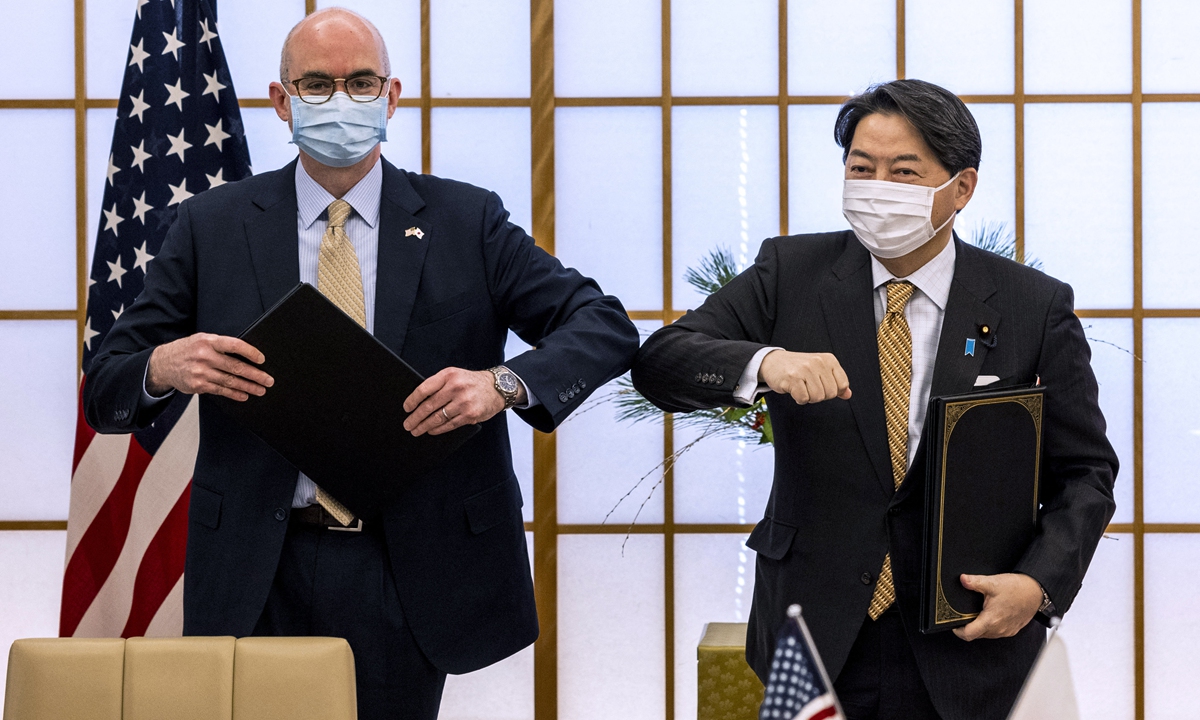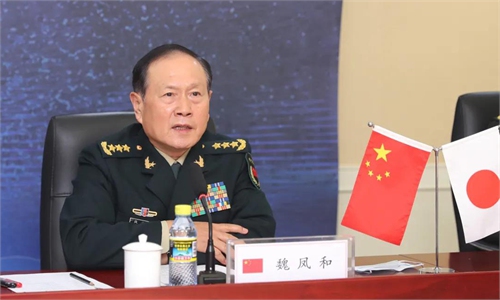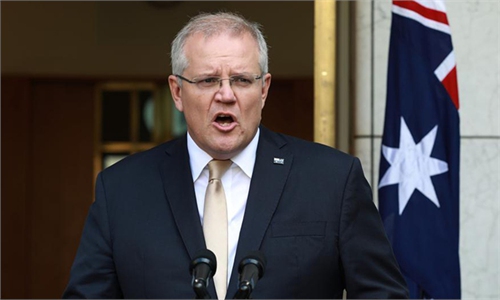Japan deepens defense ties with US to target China, seeking to justify amending the war-renouncing constitution

Japan's Foreign Minister Yoshimasa Hayashi (right) and Raymond Greene, Charge d'Affairs ad interim of the US embassy in Japan, bump elbows after signing a New Special Measures Agreement and Japan-US Joint Research in Tokyo on January 7, 2022.
Aiming to deepen defense cooperation, the US and Japan on Friday held a virtual 2+2 meeting, with a new five-year agreement on sharing the cost of US military presence in Japan signed. Experts said that Kishida Fumio's cabinet, under pressure from the country's domestic right force and US Biden administration, has itself heading in a dangerous direction as the US-Japan alliance has become increasingly weak and foolishly isolated in the Indo-Pacific region.
The meeting involved foreign and defense ministers from the two countries and also - somewhat routinely - targeted China, which was described as undermining the (US devised) rules-based international order, and posing "present political, economic, military, and technological challenges to the region and the world."
The ministers' joint statement also managed to mention China's internal affairs and core interests in Xinjiang, Hong Kong and Taiwan, with Chinese Foreign Ministry spokesperson Wang Wenbin expressing strong dissatisfaction and firm opposition about the statement on Friday.
Wang noted that some countries (like Japan and the US) have been forming cliques to target others and flex their military muscles. Doing so runs counter to the trends of peace and development in the region and contradicts their own claims of opposing coercion, he added.
The 2+2 meeting came one day after the signing of a new agreement between Japan and Australia - another US vassal state in the Asia-Pacific region. The Reciprocal Access Agreement, Japan's first with any country, will enable Australia and Japan's militaries to work more closely on defense-related matters.
Wang urged the US, Japan and Australia to earnestly fulfill their due international responsibilities. "China urges the US, UK, and Australia to stop their nuclear submarines project, stop pushing for Fukushima nuclear-contaminated water to be released into the Pacific, stop denying and beautifying historical militarist aggression, and stop stirring up region division," Wang said.
During the meeting, US Defense Secretary Lloyd Austin also managed enough time to hype up the "threats" North Korea and Russia pose to a "free and open" Indo-Pacific.
US Secretary of State Antony Blinken said at the meeting that the two countries will also sign a deal to more closely collaborate in the development of defense-related technologies, likely a response to North Korea's hypersonic weapons test on Thursday.
According to Kyodo News, Japanese Defense Minister Nobuo Kishi, the brother of Japanese former Prime Minister Shinzo Abe, addressed a separate post-meeting briefing, saying that Japan needs to "strengthen its comprehensive missile defense capability."
Regarding Japan's war-renouncing constitution, Japan's recent moves around the US Indo-Pacific framework are viewed by some analysts as a strengthening of a counter-China mentality, as the impact of Shinzo Abe still shadows the Kishida cabinet.
Japan's right wing politicians want to justify amending the war-renouncing constitution by cooperating with the US to hype up "threats" from China, Russia and North Korea, but this is a move in a dangerous direction, Liu Jiangyong, vice dean of the Institute of Modern International Relations at Tsinghua University, told the Global Times on Friday.
"The constitutional amendment would allow Japan to form a US-centric military bloc with the US and Australia, enabling a joint operational system against China. If the amendment cannot be completed in the short term, Japan can also adopt some law enforcement articles under the current constitution to gradually make Japan a war-able country," Liu said.
The Japanese government plans to review and revise the country's National Security Strategy by the end of 2022, media reported.
However, experts did note out that Japan - the only country that Washington can really count on in Asia - is itself ambivalent.
The Philippines, Singapore, Thailand and South Korea, Washington's so-called treaty allies, actually pose little use to the US in terms of containing China. Elsewhere, India's interests are oftentimes at odds with those of the US, and Australia's strength is non-existent, said Lü Xiang, a research fellow and expert on US studies at the Chinese Academy of Social Sciences.
Japan is paying the US more and more for its military presence, and shouldering more regional responsibilities to contain China. But Japanese politicians have realized that China's military development has made Japan-US collusion less and less meaningful, Lü said.
The result of the 2+2 meeting was that Japan agreed to pay US forces stationed in Japan 1.05 trillion yen ($9 billion) over five years from April. In November 2021, US Republicans introduced a similar legislation providing $2 billion in foreign military financing annually to the Taiwan authority in US arm sales.
"If Japan becomes involved in a war with China, then China's imminent counterattack would be unbearable and fatal for Japan," Lü said. "Japan does not dare say that its alliance with the US is no longer important, but developing joint combat capabilities with the US increases its own risks," Lü added.



